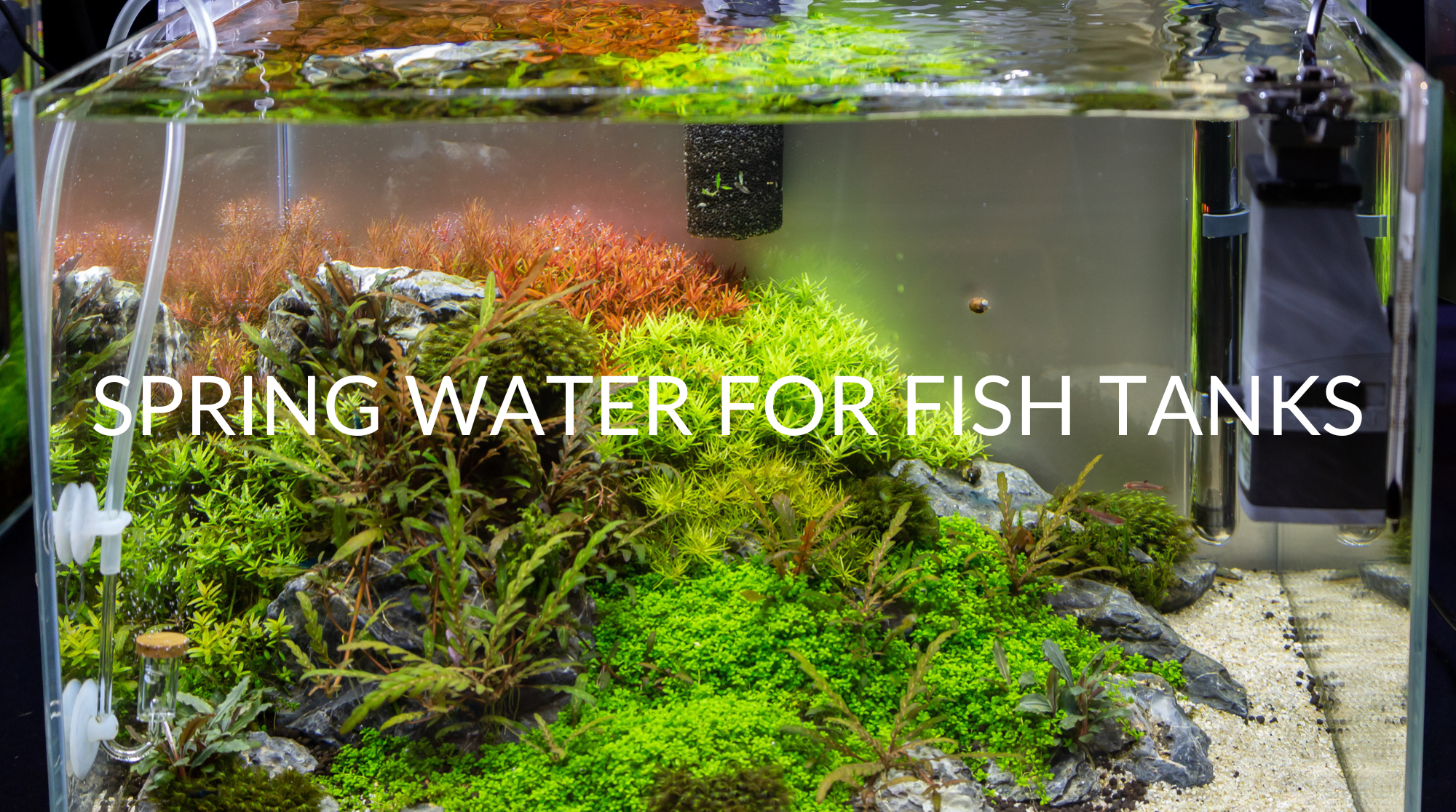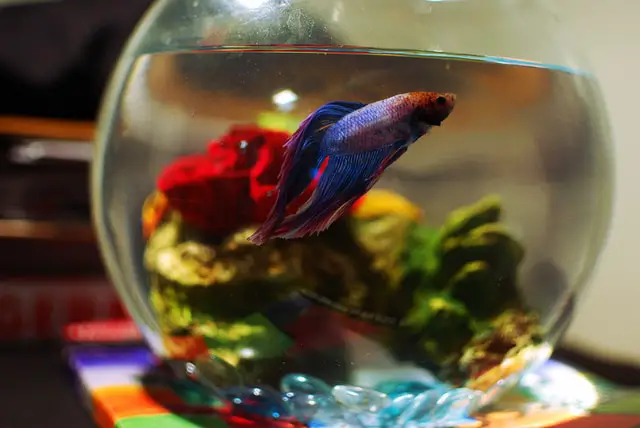Originally posted on May 25, 2023 @ 1:00 am
Last Updated on 12 hours by admin
As pet owners, we always strive to provide the best care for our beloved animals. For those who have betta fish, choosing the right water to use is crucial for their health and well-being. Some pet owners have opted for spring water as their choice of water for their betta fish. But is it really the best option? In this article, we will explore the pros and cons of using spring water for your betta fish and help you make an informed decision.
Using spring water for your betta fish can have its pros and cons. On the one hand, spring water is free from harmful chemicals and pollutants found in tap water. On the other hand, spring water may not provide the necessary minerals and nutrients that your betta fish needs. Additionally, it may be more expensive and less convenient than tap water. It is important to weigh the benefits and drawbacks before deciding to use spring water for your betta fish.

Using Spring Water for Your Betta Fish: Pros and Cons
Pros of Using Spring Water
Spring water is a popular choice among betta fish owners for several reasons. Here are some of the benefits of using spring water for your betta fish:
- Natural Minerals: Spring water contains natural minerals that are beneficial for betta fish. These minerals help maintain the pH level of the water and provide essential nutrients to the fish.
- No Chlorine: Unlike tap water, spring water does not contain chlorine or other harmful chemicals that can harm your betta fish.
However, before using spring water for your betta fish, there are some cons that you should be aware of.
Cons of Using Spring Water
Here are some of the cons of using spring water for your betta fish:
- Expensive: Spring water can be expensive compared to tap water. If you have a large tank or multiple betta fish, it can quickly become costly.
- Varying Quality: The quality of spring water can vary depending on the source. Some spring water may contain high levels of minerals or other contaminants that can harm your betta fish.
Tap Water vs. Spring Water
Before deciding whether to use tap water or spring water for your betta fish, it’s important to understand the differences between the two.
Tap Water
Tap water is the most common source of water for betta fish. Here are some of the pros and cons of using tap water for your betta fish:
- Pros: Tap water is readily available, and it’s inexpensive compared to spring water. It’s also regulated by the government, so you can be sure that it’s safe for your betta fish.
- Cons: Tap water contains chlorine and other chemicals that can harm your betta fish. You will need to treat the water with a water conditioner before adding it to your tank.
Spring Water
Spring water is a natural source of water that can be used for betta fish. Here are some of the pros and cons of using spring water for your betta fish:
- Pros: Spring water is free from harmful chemicals and contains natural minerals that are beneficial for your betta fish.
- Cons: Spring water can be expensive, and the quality can vary depending on the source. You will need to test the water to ensure that it’s safe for your betta fish.
Testing the Water
Whether you decide to use tap water or spring water for your betta fish, it’s important to test the water regularly to ensure that it’s safe.
Here are some of the parameters that you should test for:
| Parameter | Ideal Range |
|---|---|
| pH | 6.5-7.5 |
| Ammonia | 0 ppm |
| Nitrite | 0 ppm |
| Nitrate | 20 ppm or less |
Testing the water regularly will help you detect any problems early and ensure that your betta fish are healthy and happy.
Conclusion
In conclusion, both tap water and spring water can be used for betta fish, but each has its pros and cons. Tap water is readily available and inexpensive, but it contains chlorine and other chemicals that can harm your betta fish. Spring water is free from harmful chemicals and contains natural minerals, but it can be expensive and the quality can vary depending on the source.
Whichever water source you choose, make sure to test the water regularly to ensure that it’s safe for your betta fish. By providing your betta fish with clean and safe water, you can help them thrive and live a long and healthy life.
Frequently Asked Questions
What are the pros of using spring water for your betta fish?
Using spring water for your betta fish can have several benefits. Firstly, spring water is free from any harmful chemicals such as chlorine that may be present in tap water. This makes it a safer and healthier option for your betta fish. Secondly, spring water is rich in minerals and nutrients that are essential for the growth and development of your betta fish. These minerals and nutrients can enhance the colors, vitality, and overall health of your fish.
However, it is important to note that not all spring water is suitable for betta fish. Some spring water may have a high pH level or contain excessive amounts of minerals that may be harmful to your fish. It is important to do your research and choose a reputable brand of spring water that is specifically formulated for betta fish.
What are the cons of using spring water for your betta fish?
While there are several pros to using spring water for your betta fish, there are also some cons that you should be aware of. Firstly, using spring water can be more expensive than using tap water, which may not be feasible for some betta fish owners. Secondly, not all spring water is suitable for betta fish, so it is important to do your research and choose a reputable brand that is specifically formulated for betta fish.
It is also important to note that using spring water may not be necessary for all betta fish. Depending on the quality of your tap water, you may be able to use it safely and effectively for your fish. It is important to test the water quality regularly and make adjustments as needed to ensure that your betta fish are living in a safe and healthy environment.
How do I know if spring water is safe for my betta fish?
To ensure that spring water is safe for your betta fish, it is important to choose a brand that is specifically formulated for betta fish. These brands will have the appropriate pH level and mineral content that is safe and healthy for your fish. Additionally, you can test the water quality using a water testing kit to ensure that the water is free from harmful chemicals and has the appropriate mineral content for your betta fish.
It is also important to monitor your betta fish after introducing spring water to their tank. If you notice any changes in their behavior or health, such as lethargy or discoloration, it may be a sign that the water is not suitable for your fish.
Can I use spring water for other types of fish besides bettas?
Yes, spring water can be used for other types of fish besides bettas. However, it is important to research the specific needs of your fish and choose a spring water brand that is appropriate for their requirements. Some types of fish may require a different pH level or mineral content than bettas, so it is important to choose a brand that is specifically formulated for their needs.
Can I mix spring water with tap water for my betta fish?
Yes, you can mix spring water with tap water for your betta fish. This can be a cost-effective option for betta fish owners who want to use spring water but cannot afford to use it exclusively. However, it is important to test the water quality regularly to ensure that the pH level and mineral content are appropriate for your fish. Additionally, it is important to slowly introduce the mixed water to your betta fish tank to avoid shocking your fish with sudden changes in water chemistry.

(Colorful Life )All about betta fish water to make the betta stronger.
In conclusion, using spring water for your betta fish can have both pros and cons. While spring water may have natural minerals and a balanced pH level, it can also contain unknown contaminants that could harm your fish. It’s important to do your research and choose a reputable brand of spring water that has been tested for purity.
Another option is to use a water conditioner to treat tap water for your betta fish. This can remove harmful chemicals such as chlorine and chloramine, and also balance the pH level. However, it’s important to follow the instructions carefully and not overuse the conditioner, as this can also be harmful to your fish.
Ultimately, the best choice for your betta fish depends on their individual needs and the quality of your local water source. Consulting with a veterinarian or knowledgeable pet store employee can help you make an informed decision and provide the best possible care for your beloved aquatic pet.
